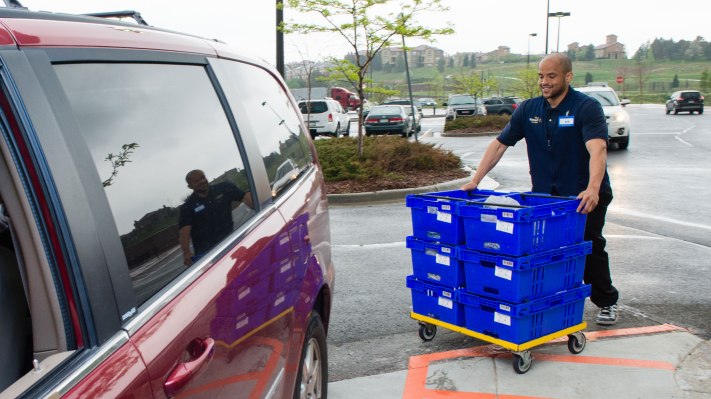
Walmart in 2016 said it would begin testing last-mile delivery using services like Uber, Lyft, and Deliv to bring customers’ orders, including groceries and Sam’s Club orders, to their homes. Last year, Walmart ended its grocery delivery deal with Uber following a similar wind-down with Lyft, and today it’s ending the deal with Deliv as well, according to a report from Reuters.
Deliv had started working with Walmart in pilot markets, including Miami and San Jose, as one of the few services Walmart was testing for last-mile deliveries at the time. The retailer has since significantly expanded its delivery operations through an array of partners to markets across the U.S., in relatively short order.
Walmart this morning confirmed to TechCrunch that Deliv was not a large part of its operations. The retailer said Deliv was only working with 3 Walmart stores out of the total 800, and in only 1 market out of 100, at the time the deal ended.
The retailer in 2018 said it was on track to expand grocery delivery to more than 40 percent of U.S. households by year-end, meaning a jump from just 6 markets to over 100 metros during a year’s time. Uber and Lyft, however, were dropped in May 2018, as Walmart shifted more of its deliveries to other partners, like Postmates and DoorDash.
Last month, Walmart added a handful of new partners, as well, including Point Pickup, Skipcart, AxleHire and Roadie. It said it planned to expand grocery delivery from the 800 stores in 100 U.S. metros where it’s live now, to double that number by the end of 2019.
In Canada, Walmart works with Instacart, which also partners with Walmart’s Sam’s Club in the U.S.
Despite the quick expansion, Walmart’s decision to work with third-party courier services instead of bringing delivery operations in-house has led to some problems. Simple tasks, like allowing customers to change pickup orders to delivery or vice versa, are often impossible. Technical and logistical issues also often can’t be communicated directly from drivers to Walmart, but have to go through the third-party delivery partner.
According to Reuters, Deliv drivers were frequently having to wait up to 40 minutes for grocery orders when they arrived at the store for pickup, as Walmart was unable to process the online orders fast enough, the report claimed. The report also said delivery volume was low in some Walmart delivery markets, and orders had to travel long distances, which caused both Walmart and Deliv to lose money at times.
Related to Walmart’s decision to end its partnership with Deliv, the companies will also no longer operate the keyless entry test in partnership with smart lock maker August Home. Announced in fall 2017, the test would allow customers with August smart home devices to have their packages delivered inside their home, instead of left on the doorstep.
This gives Amazon an advantage in keyless entry, as its Key by Amazon product last month expanded to include garage and business delivery, new locks and Ring compatibility.
“In 2017 we began a pilot program with Deliv in San Jose to understand how the Walmart Grocery Delivery model would work with a scheduled platform,” a Walmart spokesperson told TechCrunch, confirming the news.
“As with any pilot, the intent is to learn and ultimately came to the conclusion that Deliv’s platform was not the best fit for our program. Today, we work with a number of third-party delivery companies operating an on-demand based platform, and we will continue to test different delivery approaches that will help us continue to learn,” they added.
Deliv raised $40 million in Series C funding last October, from Google, Clayton Venture Partners, UPS, General Catalyst Partners, The Macerich Company, PivotNorth Capital, RPM Ventures, and Upfront Ventures. It also works with Best Buy, Macy’s, Home Depot and Walgreens.
Correction: Lyft wind-down was in 2016; this has been updated.
